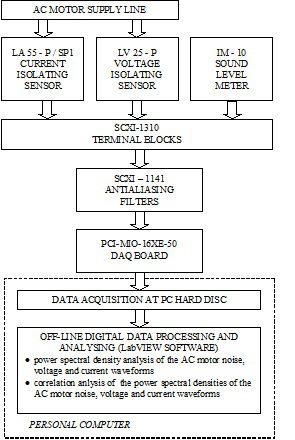The AC motor voltage and audible noise waveforms in ship’s electrical drive systems with frequency converters

Description
The presented dataset is part of research focusing on the impact of the ship's electrical drive systems with frequency converters on vibrations and the level of audible noise on ships.
The influence of electric disturbances on audible noise in frequency controlled AC drive systems were examined. The conclusion of the study was to indicate that applying a filter connected at the output of the frequency converter not only reduces the level of electrical disturbances in the AC motor voltage but also significantly decreases the level of an acoustic noise of the motor.
The experiments based on a model of the marine drive system with a frequency converter were performed at the laboratory of the Department of Ship Automatic Control at Gdynia Maritime University. The measurements were carried out for two cases, first, the squirrel cage asynchronous motor was connected directly to the output of the frequency converter, then to confirm the thesis of the correlation between harmonics contents in motor voltage waveforms and acoustic noise of the motor, the sinusoidal LC passive filter was connected at the output of the frequency converter. During tests, the motor was nominally loaded with the use of the DC generator connected to an adjustable resistor. The sound level meter was pointed directly to the source, positioned at a distance of 1m from the motor lifting eye, in the motor axis of symmetry, from the drive end, 1m above the floor.
The data acquisition of audible noise level (A-weighed) and voltage waveforms were carried out with the digital measurement system. The block diagram of the measurement system is shown in Figure. The AC motor voltage and audible noise waveforms were recorded in digital form, for the few different output voltage frequencies fout (20 Hz, 23 Hz, 25Hz, 40 Hz, 46 Hz, 50 Hz) and few different inverter’s transistors switching frequencies fsw (3 kHz, 6 kHz, 12 kHz). Then, the measurement procedure was repeated with the output LC passive filter, for all output voltage frequencies fout and two inverter’s transistors switching frequencies fsw (6 kHz, 12 kHz). The sampling frequency was equal to 20 000 Hz and is inserted in the first row of attached files, in which voltage values are saved in the form of text data. The values of the voltage samples in volts are smaller than the motor supply line voltage due to the attenuation brought by the voltage isolating sensor. The measured sound level has been A-weighed during experiments. The sound files are in a PC wave file (.wav) format.
The files are described as follows: name (U - voltage, H - sound) fsw _ fout for data, which was recorded while the motor was supplied directly from the frequency converter. Data from measurements, with the output LC sinusoidal filter, can be found in the files described as follows, name (U - voltage, H - sound) fsw_fout_filter.

The block diagram of the digital system for measurement and analysis of audible noise
and disturbances in the motor supply line
Dataset file
hexmd5(md5(part1)+md5(part2)+...)-{parts_count} where a single part of the file is 512 MB in size.Example script for calculation:
https://github.com/antespi/s3md5
File details
- License:
-
open in new tab
CC BYAttribution - Raw data:
- Data contained in dataset was not processed.
Details
- Year of publication:
- 2020
- Verification date:
- 2020-12-17
- Creation date:
- 2003
- Dataset language:
- English
- Fields of science:
-
- Automation, electronic and electrical engineering (Engineering and Technology)
- DOI:
- DOI ID 10.34808/8cq0-2r35 open in new tab
- Verified by:
- Gdańsk University of Technology
Keywords
- ship’s electrical drive system
- frequency converter
- sinusoidal LC filter
- AC motor voltage
- audible noise
- electric disturbances
References
- publication Pomiar zakłóceń elektrycznych i hałasu okrętowego systemu napędowego z przemiennikami częstotliwości.
- publication The influence of frequency controlled ac drives on vibration and audible noise level on ships
- dataset Audible noise in ship’s electrical drive systems with frequency converters
- dataset The power spectral density of audible noise and electric disturbances in ship’s electrical drive systems with frequency converters
Cite as
Authors
seen 256 times
